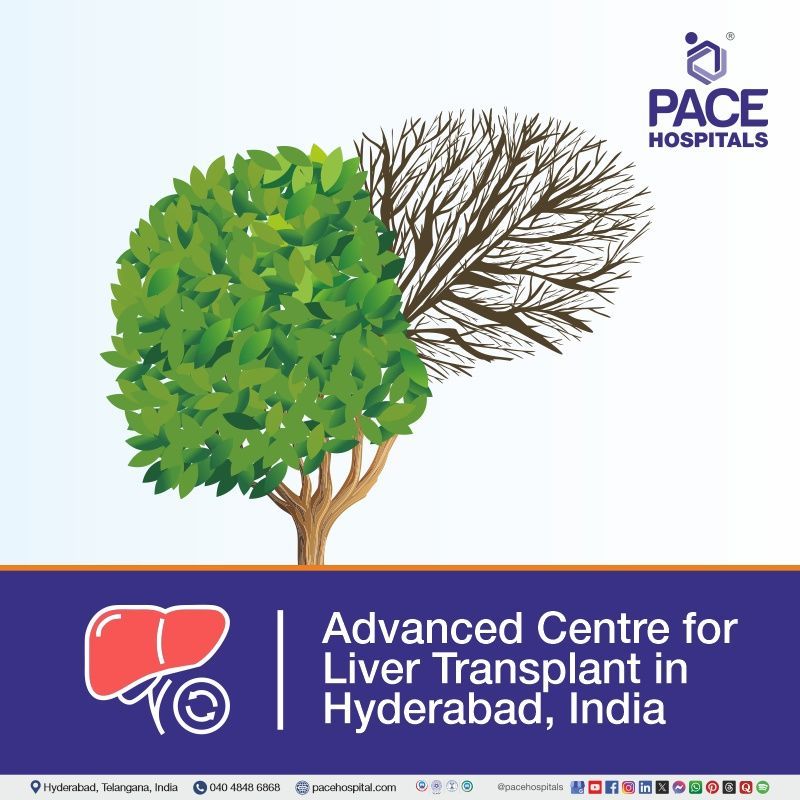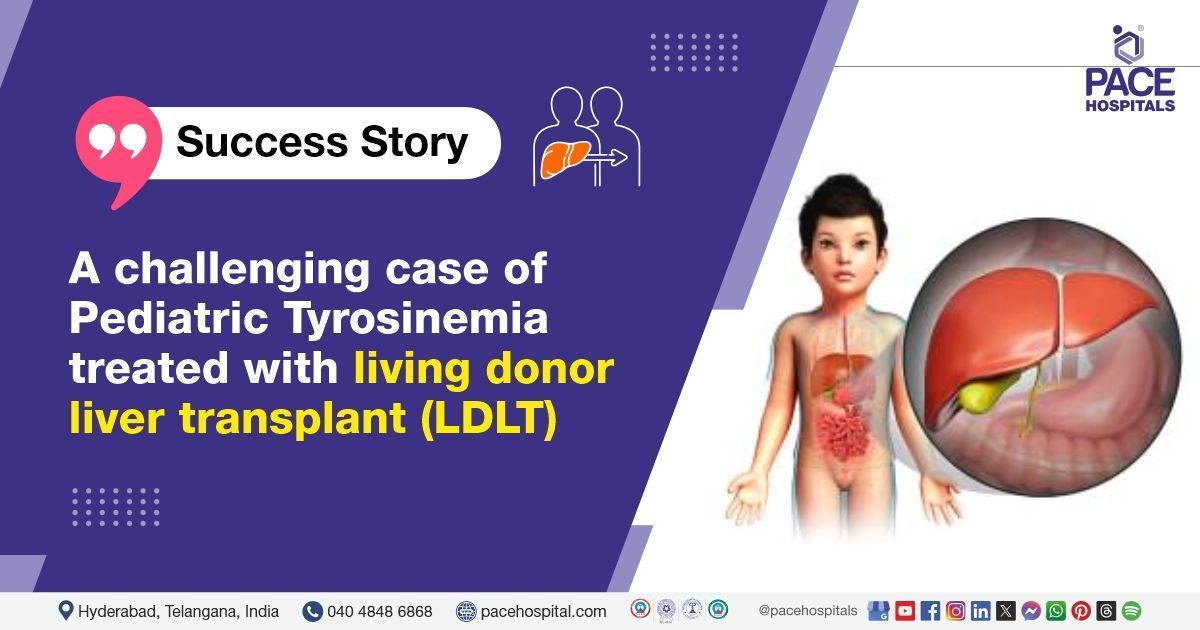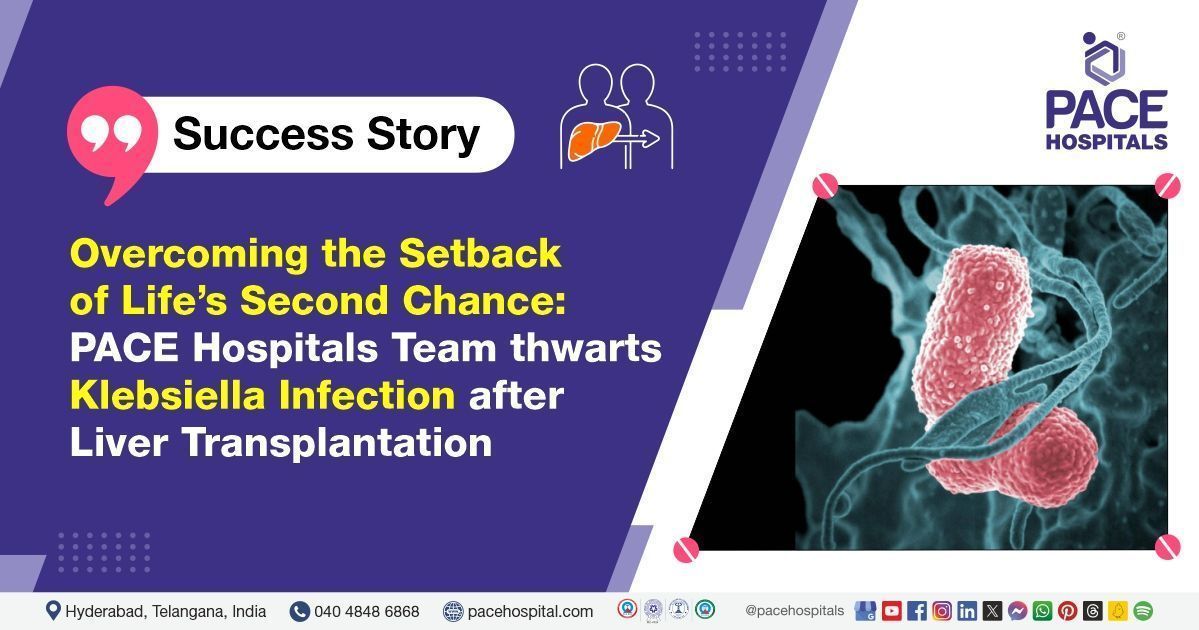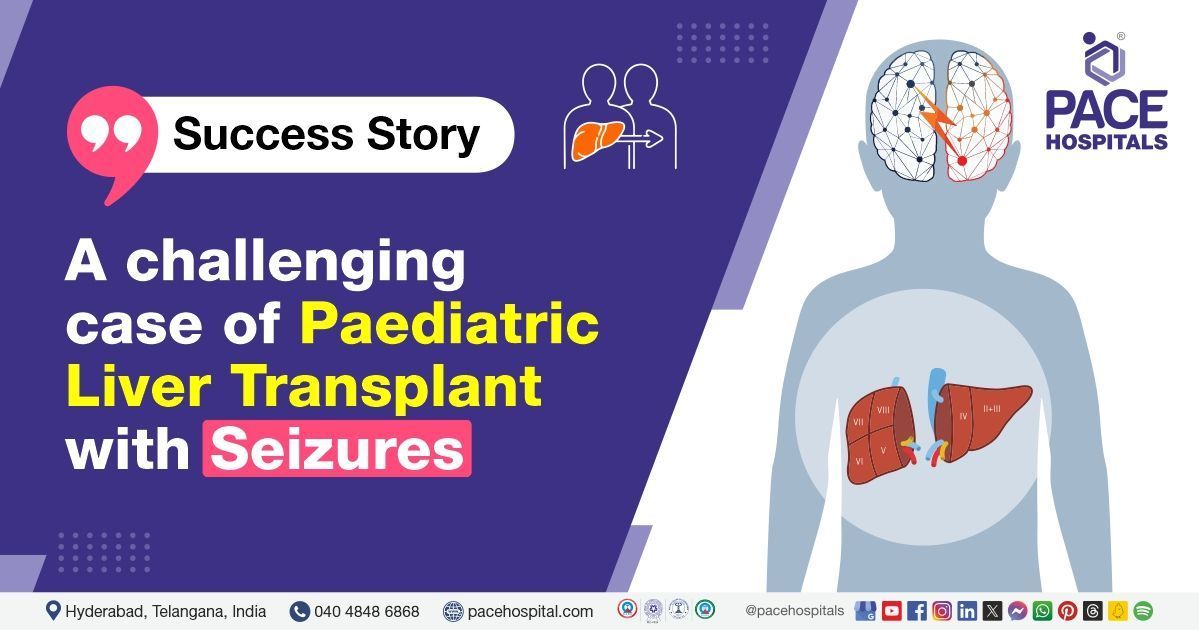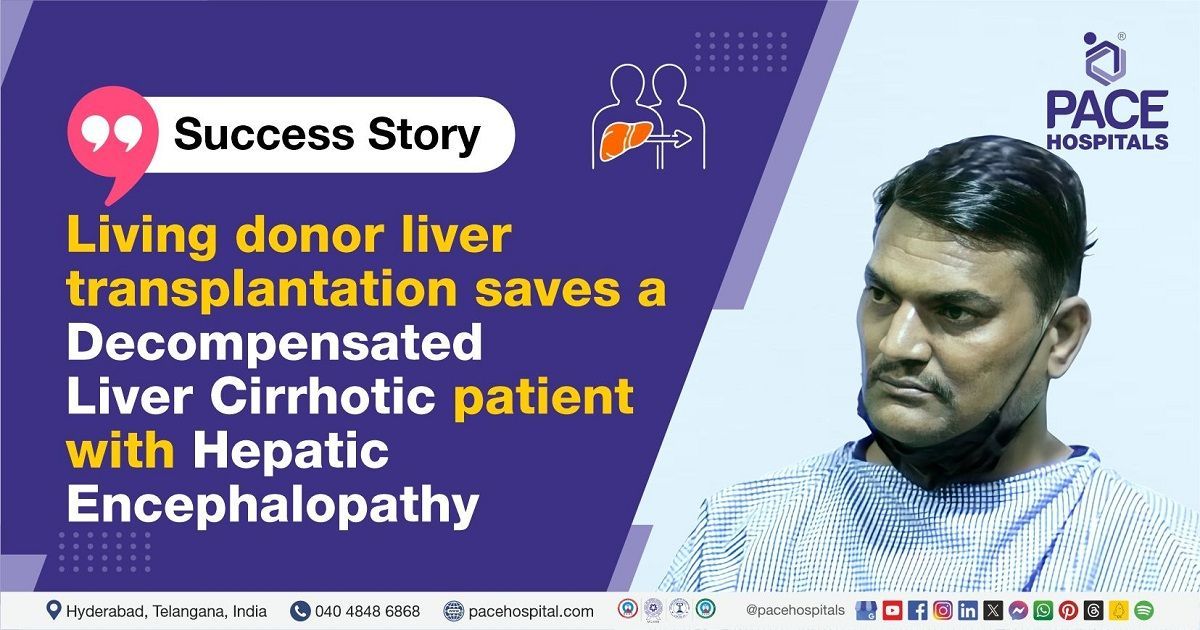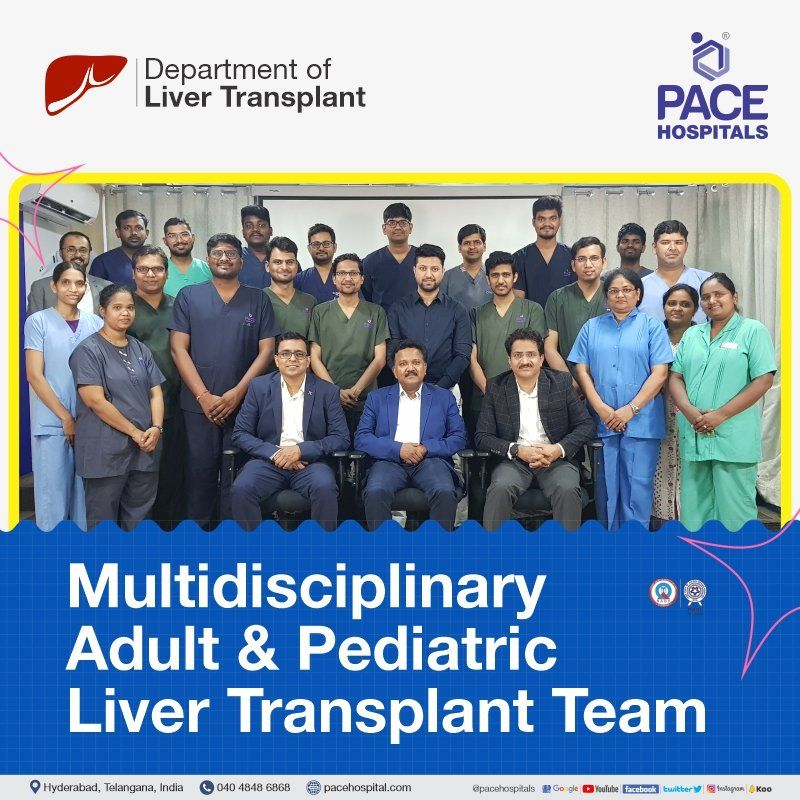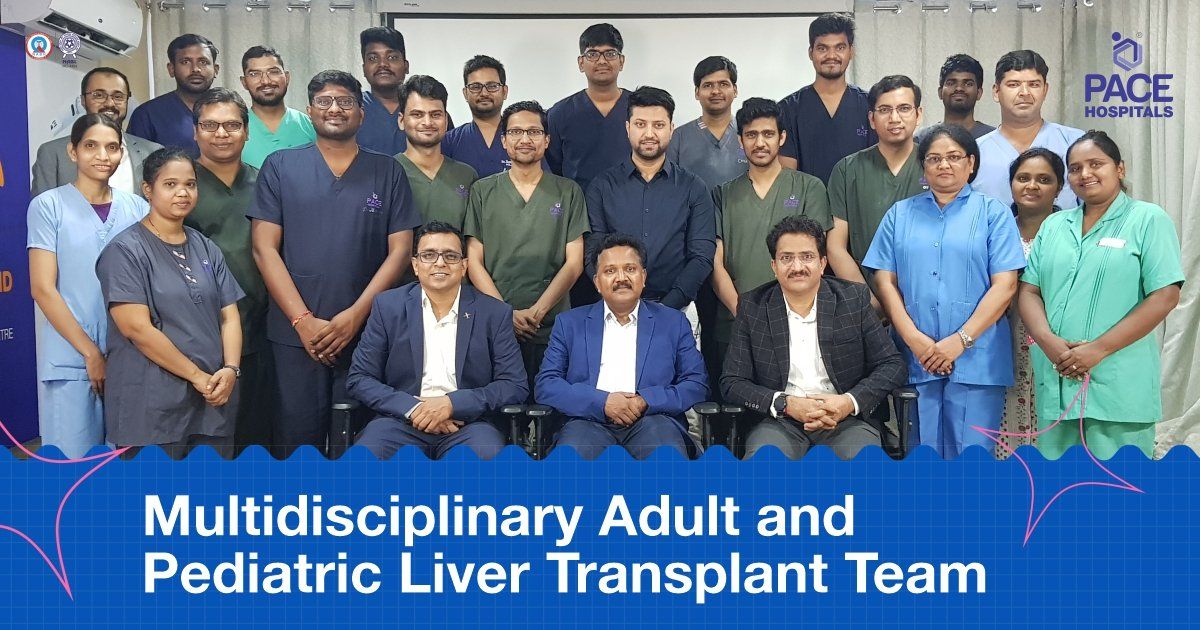Best Liver Transplant Hospital in Hyderabad, India
We have team of the best liver transplant surgeon in India, they are having 30 years of extensive experience in performing Living donor liver transplant, Deceased donor liver transplant and Orthotopic liver transplant surgery with the high success rate.
Request an appointment for Liver Transplant Surgery
Liver Transplant Appointment Query
PACE Hospitals is one of the Best Liver Transplant Centre in Hyderabad, Telangana, India backed up with team of the top liver transplant doctors including liver transplant surgeons, transplant hepatologists, interventional pulmonologists, cardiologists, nephrologists, paramedical staffs, dietitians and physiotherapists in Telangana, India.
Liver Transplant Team at PACE Hospitals, Hyderabad evaluates the recipient and liver transplant donor thoroughly before performing the transplant by doing medical and radiological investigations including Blood test, Urine test, CT Scan or MRI Scan to ensure the fitness of the recipient and the donor. Living donor liver transplant followed by a detailed and extensive evaluation of the donor first, because liver transplant donor safety is extremely important before giving medical fitness clearance.
We do not provide the guarantee of obtaining liver for transplantations. In case of unavailability of a matching liver from living donor for transplant, the patient can get registered at PACE Hospitals for the procurement of a matching liver from cadaver or deceased-donor for transplant. PACE Hospitals keeps greatest effort to ensure the obtainment of liver but does not provide any guarantee. Liver Transplantation will happen as per state and center govt. rules and regulations.
Media and News Release - Adult and Paediatric Liver Transplant at PACE Hospitals, Hyderabad
Top Liver Transplant Hospital in India
Department of Liver Transplantation at PACE Hospitals, provides extensive and exceptional quality of deceased donor, living donor liver transplant & orthotopic liver transplant. The department comprises with a multidisciplinary team of liver transplant and dedicated liver intensive care units (LICU) that help to accomplish complex surgeries with high success rates.
Our team of liver transplant surgeons, transplant hepatologist and liver specialists are having extensive experience in performing complex transplants and surgeries, they are highly trained and skilled to perform the surgery with precision and accuracy. Transplant team is backed with state-of-the-art technology, The World’s First Universal Surgical Robotic System, State-of-the-art facility, world-class laser treatment equipment offering comprehensive treatment.
PACE Hospitals is considered as one of the Top Liver Transplant Hospital in Hyderabad, Telangana, India. Our department of Liver Disease treated many patients with diseases and conditions related to various types of liver diseases such as non-alcoholic fatty liver disease, hepatitis b and c, cirrhosis of the liver, alcoholic hepatitis, ascites, hemochromatosis, jaundice, acute or chronic liver failure, fatty liver disease, hepatocellular carcinoma or liver cancer, hepatorenal syndrome and vascular liver diseases etc.
What is Liver Transplant Surgery?
Liver transplant definition or meaning
Liver transplantation is a surgical procedure in which the liver which is not functioning properly is replaced by a healthy liver or a part of a liver from a living donor or deceased donor. A liver transplant also called as hepatic transplantation that removes the injured or diseased liver and replaces it with a healthy liver. This process of replacement is also known as allograft. It can potentially save people in case of a liver failure.
Liver failure can have serious complications, accompanied by several health visits, and you can be admitted. Living donor transplant can be an alternative to waiting for a deceased donor liver to become available.
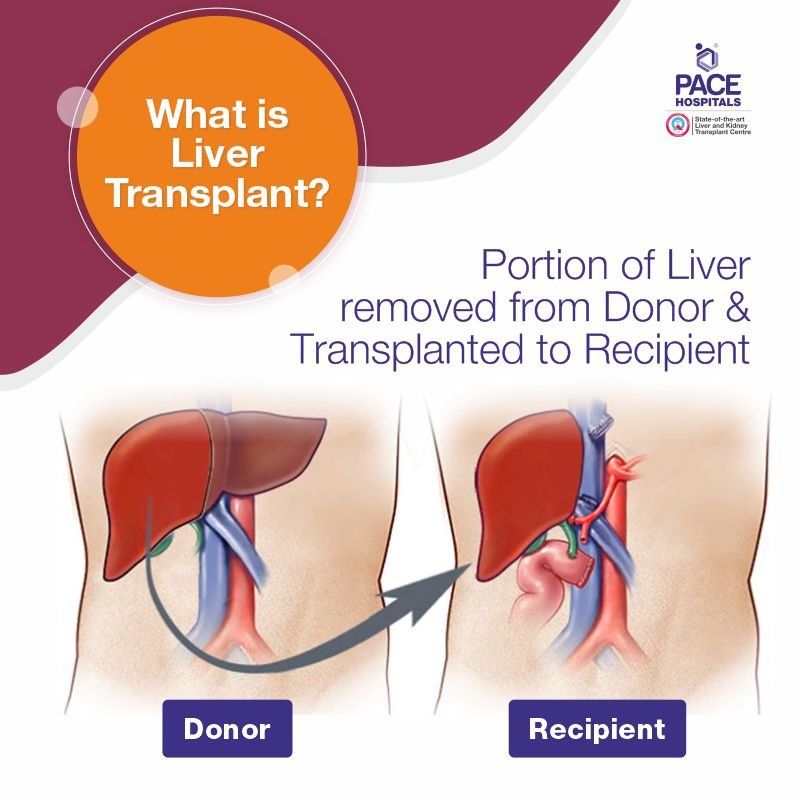
Indications for Liver transplant
Patients are to be considered for liver transplantation if they have any of the following conditions:
- Fulminant hepatic failure - severe necrosis of hepatocytes or severe disability of hepatic functions in the absence of preexisting liver disease
- Liver-based metabolic defect - Hereditary hemochromatosis, Alpha-I antitrypsin deficiency (AATD), and Wilson Disease
- Cirrhosis with complications such as ascites, hepatic encephalopathy, ascites, hepatocellular carcinoma, hepatorenal syndrome
- Bleeding caused by portal hypertension
Patients are required to go through with a detailed medical evaluation before the transplant by the organ transplant centres. After evaluation approved patients are placed on the transplant list, based on the End-Stage Liver Disease (MELD) score donor liver is assigned to the recipient with the highest estimated short-term mortality.
The wait for a recipient varies greatly based on the extent of the damage. Based on the damage, the recipient may have to wait for day or months or may never receive a liver on time. As the recipient wait for a liver, the doctor may put recipient on medications to relieve the discomfort.
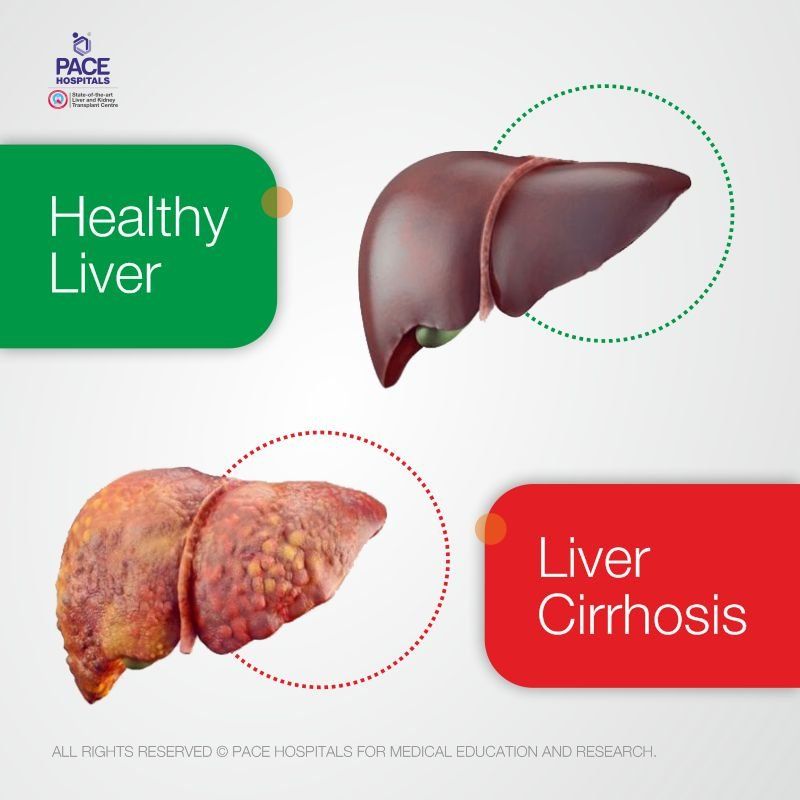
Causes of Liver transplantation
The liver is the largest internal organ in the human body and the only organ that can regrow itself. The liver significantly serves many critical functions such as regulation of drugs and toxins in metabolism, clearing ammonia and bilirubin and infusing important proteins and enzymes (blood clotting for example).
A liver failure may happen quickly which is referred to as Acute liver failure or may be Chronic, i.e. happening slowly over months and years and causing cirrhosis, i.e. scarring of the liver.
Cirrhosis hampers the liver’s ability to function properly because of scarring. Scar tissues replace the healthy tissues of the liver and make it difficult for the liver to function, leading to liver failure that require Liver Transplantation.
Major causes of cirrhosis, leading to liver failure requiring liver transplant, includes:
- Alcoholic liver disease
- Nonalcoholic fatty liver disease
- Primary liver cancers
- Autoimmune hepatitis
- Metabolic diseases
- Acute hepatic necrosis
- Genetic diseases (Wilson's disease & Hemochromatosis)
- Infections such as Hepatitis B and C
- Bile duct diseases such as primary sclerosing cholangitis, primary biliary cirrhosis and biliary atresia.
Types of Liver Transplant
There are mainly three types of liver transplantation and performed based on the recipient requirements. Most of the cases, deceased donor liver transplant is the choice of treatment for ESLD patients.
Deceased Donor Liver Transplant
It is also called as cadaver liver transplant that involves transplantation of liver from a recently deceased donor.
Living Donor Liver Transplant
Living donor transplant involves transplanting a part of a liver from a living donor.
Split Liver Transplantation
The liver is removed from a recently deceased donor and split into two parts
What to expect before a liver transplant surgery?
Cadaver donor liver transplant - Transplant team will check the blood test, imaging test and other factors to evaluate the disease severity, urgency of transplant and place on the cadaveric liver transplant waiting list. Priority to get the cadaver or deceased donor while on waiting list decided by scoring system End-Stage Liver Disease (MELD) for adults and Pediatric End-Stage Liver Disease (PELD) for children below 12 years of age.
High score indicates the person require transplant on urgent basis. Patients with higher MELD or PELD gets the donated livers first. In case of liver cancer and other exceptional liver conditions, organ transplant centre (OTC) can request for additional points for MELD or PELD to get the cadaver donor fast.
In acute liver failure MELD or PELD scoring system is not taken into consideration, patients are placed higher on the waiting list based on the severity for cadaveric liver transplant. Till the patients are not getting liver transplant donor, doctors will give medicines to treat the complications of End-Stage Liver Disease and relive symptoms to make patients comfortable.
Living donor liver transplant - Patients those who are waiting for a deceased-donor liver, Living donor liver transplantation is offered as an alternative solution. This will help patients to avoid future complications of liver disease while waiting for deceased donor.
Lobe selection for living donor transplant depends upon the donor organ anatomy, blood group and age. Immediate family members can donate the liver. Before liver transplant, living donors have to go through with extensive evaluation process to ensure they are a match with the organ recipient.
Maintaining health – It is extremely important for patients those who are waiting for liver transplant to follow the medications and diet guidelines, do regular exercise, staying healthy, regular follow up with transplant and being ready when the time comes for transplant surgery.
What to expect during a liver transplant surgery?
Cadaver donor liver transplant
In case of deceased donor is available, organ transplant centre will inform patients to get admitted in the hospital, after thorough examination to assess the complete health of the patient transplant team will perform liver transplant surgery.
During orthotopic liver transplant surgery, a liver transplant surgeon removes the damaged liver by following the process called as hepatectomy (liver resection) surgery from the recipient and replaces it with the liver from the deceased donor. Surgery can go up to 8 to 10 hrs. After successful completion of surgery, the patient will be moved to intensive care unit.
Living donor liver transplant
It is very important to assess the living donor before the orthotopic liver transplant surgery, after extensive evaluation transplant team removes the healthy part of liver by doing hepatectomy surgery (liver resection) from living donor and replace it with the damaged liver from the recipient.
Liver regrows within 15 to 20 days in both donor and recipient after the surgery and reaching normal volume.
What to expect after a liver transplant surgery?
Most people would be required to stay in hospital for up to 15 to 20 days after transplantation for monitoring. A person who got liver transplant need regular follow-up to monitor the progress.
Recovering from a liver transplant can take a long time, but most people will gradually return to many of their normal activities within a few months.
Liver Transplant Patient Stories
The transplant team at PACE Hospitals has successfully performed liver transplant for a child with rare genetic disorder “Alagille Syndrome” in a very frail 8-year-old child.
40 years Male from Vijayawada, complaint with Chronic Liver Disease with decompensation was successfully treated with Living donor Liver Transplant Surgery (LDLT).
55-year-old patient from Tinsukia, Assam with a complaint of decompensated chronic liver failure, ascites was successfully treated with living donor liver transplantation (LDLT).
Frequently asked questions on Liver Transplantation
Is liver transplant possible?
Yes. A liver transplant surgery is possible. It is a major operation for replacing a damaged or diseased liver with a healthy one from a liver transplant donor. Its frequent indication is seen among people in whom the liver can't operate normally (usually end-stage liver disease or liver failure). Illness, infection, or alcohol may slowly deteriorate the liver, causing cirrhosis followed by necrosis (tissue death) and liver failure.
Since 1998 liver transplant surgeries have been performed in India. To date more than 1800 liver transplants were annually performed.
Does liver regenerate after transplant?
The uniqueness of the liver lies in its ability to regenerate in case of partial removal in the donor body. Regeneration is also seen in the recipient's body, where a part of the liver is transplanted. The functional restoration and regeneration, respectively, are seen within one week and 6-8 weeks.
The liver's capacity to regenerate is a reasonable evolutionary adaptation, given its function as a major detoxification organ, and toxins may damage it. Regeneration in response to damage or partial liver removal includes replicating mature liver cells, not stem cells.
Who all are involved in Liver Transplantation?
Liver transplant is a process where a team of medical and surgical staff are involved to evaluate the liver transplant donor and recipient. The Liver Transplant Team at PACE Hospitals is trained specially in fulfilling the needs of liver transplant patients. The Liver Transplant Team members include:
- Liver specialist (transplant hepatologist)
- Transplant surgeons
- Transplant coordinator, who is usually a registered nurse
- Intensivist, a critical care physician
- Radiologist, diagnosing injuries and diseases
- Psychiatrists who can help you cope with the psychological effects of the transplant
- Anesthesiologist, to discuss potential anesthesia risks
- Nutritionist, who can evaluate your current nutritional status
- Clinical Pharmacist, to review your medications for potential drug interactions
How long can a person live with liver transplant?
As per the recent data, liver transplant survival rate - 90 to 95% of people with liver transplant survive for at least 1 year, 85% of the people may live for at least 3 years and 75% of the people may live for at least 5 years after the transplant.
On an average, liver transplant 10-year survival rate is approximately 65% and liver transplant 20-year survival rate is approximately 55%. Many of them may live more than 20 years after the transplant with improved quality of life.
How much liver is needed for a transplant?
If the right lobe is being donated, around 60-70% of the whole liver can be transplanted. In case of left lobe, around 30-40% of the whole liver can be transplanted.
The uniqueness of liver lies in its ability of regeneration in case of partial removal in the liver transplant donor body. Regeneration is also seen in the recipient body in whom a part of liver is transplanted. Within 1 week and 6-8 weeks’ the functional restoration and regeneration respectively be seen.
Can you live a normal life after a liver transplant?
Yes. It is possible to lead a normal live with a few precautions. After a liver transplant, most patients may return to most of their usual activities and enjoy a decent quality of life. Recovery might take up to a year, although they can normally start ramping up your activities after a few weeks without forgetting the regular follow-up appointments with the doctor. Among the therapeutic regimen, immunosuppressants are primarily prescribed.
A well-balanced healthy diet, avoiding alcohol indulgence and a routine exercise can help enhance the recovery process.
Is liver transplant successful in India?
Yes. Liver transplant surgeries in India are as successful as anywhere else in the world. Various studies demonstrated a 64% to 88% survival rate in Indian liver transplant surgeries in patients with acute liver failure. Since 1998 liver transplant surgeries have been performed in India. To date more than 1800 liver transplants were annually performed.
Which are the Top 10 Cadaver Liver Transplant Hospitals in India?
PACE hospitals is among the
Top 10 Liver Transplant Hospitals in India, catering Living donor liver transplant and Deceased donor liver transplant (cadaveric liver transplant) with a high success rate and 24x7 hassle-free comprehensive pre- and post-transplant support.
Is liver transplant safe for donor?
Yes. Liver transplant is as safe procedure as the liver can regenerate within 6-8 weeks. There are few possible surgical complications after liver transplant, which is common with any surgical procedure.
Can a liver donor live a normal life?
Yes, a liver donor can live a normal life after donating a portion of their liver. The liver is able to regrow to its original size within a few weeks, so the remaining portion is able to function normally. However, it is essential for the liver transplant donor to have a thorough evaluation before the surgery and to receive proper follow-up care after the donation to ensure a full recovery.
Can a wife donate liver to husband?
Yes, a wife can potentially donate a portion of her liver to her husband. Living liver donation is when a healthy person, a close family member, donates a portion of their liver to someone in need of a transplant. It means that the liver transplant donor is a biological relative of the recipient. This could include a parent, sibling, or child (son or daughter) of the person in need of a transplant.
Close family members, a blood relatives are often considered as potential living donors because they have a higher likelihood of being a suitable and best match for the recipient, both in terms of blood type and tissue compatibility. Additionally, because close family members are likely to have a strong emotional connection with the recipient, they may be more willing to consider donation. However, compatibility and overall health of the potential donor and recipient are the most important factors to be considered before proceeding with the transplant.
Does a liver transplant have to match?
To donate a part of the liver to someone who needs a liver transplant, both of them must be a good match. This is the reason the gastroenterologists or liver transplant specialists make sure that various factors of surgery such as blood type, body size, and age etc. are evenly matched to that the transplant goes well for both – the donor and the recipient.
How many liver transplants per year in India?
More than 1800 liver transplants were annually performed. Since 1998 liver transplant surgeries have been performed in India. A live donor need not be related to the recipient. The donor might be a distant cousin, friend, neighbour, or co-worker. Anyone can be a liver transplant donor if the candidate is:
- Between 18 -55 years of age
- Strong with excellent health
- Free from recreational drug indulgence
- Free from any medical conditions, especially bleeding or clotting problems
Do you need a complete liver for a transplant?
Yes. A complete healthy liver is necessary for a transplant in case of the liver being extracted from a deceased person. It can be donated to one or two or three recipients as per the requirements.
In case of liver extraction from a living donor, a complete liver is not necessary for transplant. A good 30-70% of portion of the viable healthy liver can be transplanted to the recipient as it can regenerate the rest of the portion in 6-8 weeks.
How much of your liver can you live without?
Since 30-70% of the healthy liver can be extracted for transplant, only 25-30% of the liver is needed for the maintenance of normal functions. Over time, the liver can regenerate to its normal size. When a liver is surgically decreased in size, a cellular response triggers fast regrowth.
How long do you stay after a liver transplant in the hospital?
The living donor and recipient's condition determines the length of the hospital stay. In most cases, living donor will be hospitalised for 7 to 10 days after a living-donor liver transplant, whereas recipient or patients who got the healthy liver will be hospitalised for 15 to 20 days for monitoring and faster recovery. Then Afterwards, patient generally recover at home and return to work or school after complete recovery.
Who might not get a liver transplant?
These conditions disqualify a patient for liver transplant, and a patient may not be able to have a liver transplant if having -
- Advanced liver cancer
- Severe malnutrition and muscle wasting
- A serious mental health or behavioural condition
- Severe heart problems or lung condition such as heart failure or chronic obstructive pulmonary disease (COPD)
- A serious condition besides liver disease that would not get better after a transplant.
- An infection that require treatment first
- AIDS (the final stage of an HIV infection)
Who can donate liver for transplant?
All living donors must complete in-person donor evaluation, which includes blood tests and medical imaging. In general, donor need to fulfil these conditions:
- In case of adult recipient, liver transplant donor age can be in between 18 and 55 years whereas in case of children require liver, donor age can be up to 60 years.
- Donor should be healthy, physically and mentally strong enough for surgery, recovery and psychological impact of organ donation and its possible risks.
- Donor should not have any pre-existing medical conditions, specially related to clotting and bleeding.
- In case of smoking habit, donor should quit smoking.
What is liver transplant recovery time?
It is expected to have three to six months of recovery time after liver transplant surgery. A person may be able to resume normal activities or go back to work a few months after the transplantation. The person will need to follow up with their doctors for the rest of their life. However, frequent visits might reduce after a couple of years.
Can your body reject a liver transplant years later?
The rejection risk is most significant in the first six months following a liver transplant (early). Beyond this, rejections at later stages are less common as long as patients take their prescribed immune suppression medications at the correct dosage.
Can a 70-year-old get a liver transplant?
Yes, a 70-year-old can receive a liver transplant because age is not a contraindication for a liver transplant. However, surgery should be considered judiciously in elderly recipients, as liver transplantation in the elderly is associated with a lower survival rate and increased morbidity.
What is the liver transplant success rate in India?
Liver transplant is a successful surgery where transplant surgeon replaces a patient’s damaged or partially damaged liver with a whole or partially healthy liver from another person called a liver transplant donor.
Liver transplant success rate in India is approximately 89% based on the current data, where liver transplant survival rate varies from 95% to 60% person to person.
How to get a donor for liver transplant in Hyderabad, Telangana?
Organ recipient can get the liver from a living donor in immediate family members. In case there is no living donor, person awaiting a transplant need to register at liver transplant donor waiting list on AACT, Jeevandan for cadaver donor through an Organ Transplant Centre (OTC) in Hyderabad, Telangana.
Jeevandan is a comprehensive cadaver organ transplantation scheme initiated by The Government of Telangana, proposed by the Cadaver Transplantation Advisory Committee (CTAC) to give a fillip to organ transplantation. Organ recipient registration will be done in two categories.
- Super urgent transplantation
- Elective transplantation
Jeevandan Cadaver Transplanatation Programme, Telangana priorities the list of cadaver donors. First priority shall be given to an Organ Transplant Centre (OTC) where the deceased donor is located. If, for any reason, the OTC is not able to accept the organ, the organ will be passed on to the general pool.
Super urgent transplantation registration is prioritized over elective list and general pool.
What are the liver transplant complications?
Transplant medical team monitor the patient very closely to prevent complications after liver transplant that may occur, such as:
- Transplant rejection
- Recurrence of liver ailments
- Hepatitis B and C infection
- Excessive weight gain
- Skin cancer due to drugs used during transplant
- High blood pressure
- Diabetes
- High cholesterol
- Thinning of bones
Which is the best hospital for liver transplant in Hyderabad, India?
PACE Hospitals in Hyderabad offers world-class liver transplants with high success rates. Our expert team, dedicated Liver ICU, and cutting-edge technology, including the world's 1st Universal Surgical Robotic System, prioritize patient safety and successful outcomes for both adults and children.
Is liver transplant covered by insurance in India?
Few health insurance companies cover organ transplant in India under the Transplantation of Human Organs Act 1994 and according to many insurance providers organ transplantation coverage starts after 3 to 4 years of the successful mediclaim policy completion.
It is advised to the patients to cross-check the cashless insurance coverage directly from the insurance provider. In India, most of the health insurance companies don't cover the pre- and post-hospitalization costs of the liver transplant donor, pre- and post-surgery complications.
What is life expectancy after a liver transplant?
Significant advancements in liver transplant surgical techniques, immunosuppressive medications, and post-transplant care have dramatically improved the long-term outlook for individuals undergoing liver transplantation.
Life expectancy after liver transplant:
- A high percentage (around 85% to 89%) of liver transplant recipients survive the crucial first year after surgery.
- The five-year survival rate is also encouraging, ranging from 75% to 80%.
- Many transplant recipients enjoy a lifespan of 10-20 years or more. Remarkably, some individuals have even thrived for over 30 years post-transplant.
It's important to remember that these are general statistics. Individual outcomes can vary depending on factors such as the underlying cause of liver disease, the recipient's overall health, the quality of the donor liver, and adherence to post-transplant care.
Why choose PACE Hospitals?
- A Multi-Super Speciality Hospital.
- NABH, NABL, NBE & NABH - Nursing Excellence accreditation.
- State-of-the-art Organ Transplant Centre.
- Empanelled with all TPA’s for smooth cashless benefits.
- Centralized HIMS (Hospital Information System).
- Computerized health records available via website.
- Minimum waiting time for Inpatient and Outpatient.
- Round-the-clock guidance from highly qualified Adult and Paediatric Liver Transplant Doctors / Specialist Team.
- Standardization of ethical medical care.
- 24X7 Outpatient & Inpatient Pharmacy Services.
- State-of-the-art operation theaters.
- Intensive Care Units (Surgical and Medical) with ISO-9001 accreditation.

